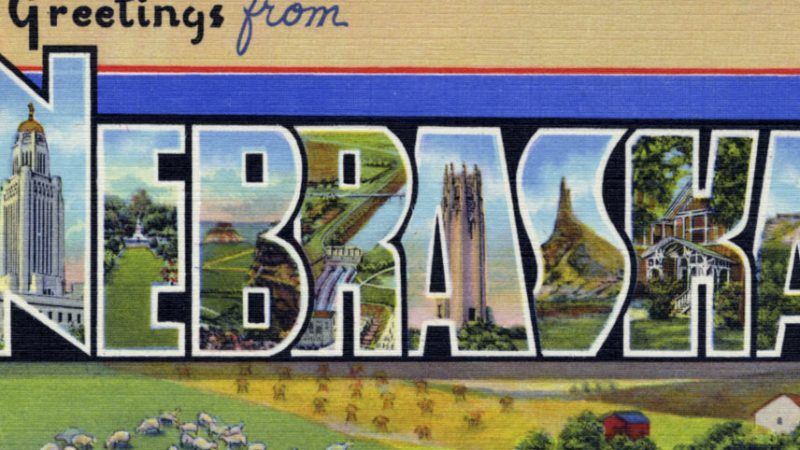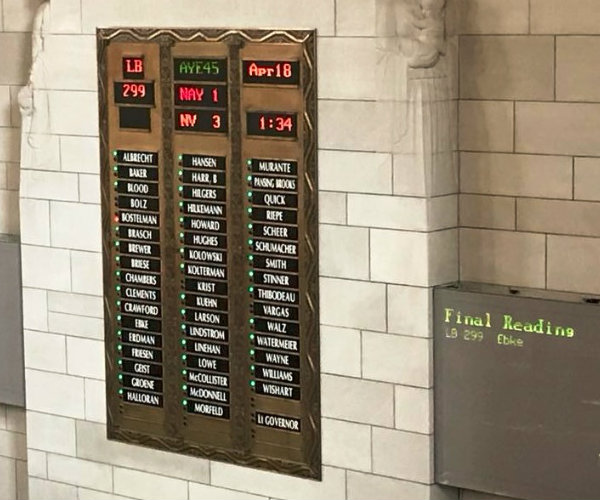Nebraska Just Passed a Major Occupational Licensing Reform Measure. Here's Why It Matters.
Libertarian state Sen. Laura Ebke's bill triggers a review of state licensing laws, opens more opportunities for individuals with criminal histories.


Nebraska lawmakers struck a rare tri-partisan blow against onerous occupational licensing laws on the 60th and final day of the 2018 legislative session, voting 45–1 to pass a major reform bill authored by Libertarian state Sen. Laura Ebke.
Ebke's Occupational Board Reform Act requires state lawmakers to undertake a review of Nebraska's occupational licensing laws with an eye toward loosening or eliminating requirements that serve as barriers to employment without benefiting public safety. The bill requires that licensing laws "respect the fundamental right of an individual to pursue an occupation" and instructs lawmakers to favor less restrictive forms of regulation—which could include private certification, registration, insurance or bonding requirements, inspections, open market competition, or a combination of these approaches—in circumstances where one-size-fits-all licensing rules violate that right.
"It will help give power back to Nebraskans to cut the hidden tax of red tape that is creating barriers for working people across our state," says Jim Vokal, CEO of the Platte Institute, a Nebraska-based think tank.
The bill's backers included the free-marketeers at the Platte Institute and the licensing reform campaigners at the Institute for Justice, a libertarian law firm that helped craft the bill. But it also won support across the political spectrum. The Nebraska chapter of the American Civil Liberties Union sponsored a series of events at locations around the state highlighting the bill's importance, and the conservatives at the Wall Street Journal editorial page called the bill a "model for licensing reform."
Nebraska licenses at least 174 different professions. (The full list, including "acupuncturists," "bulk milk haulers," "geologists," "nail technicians," "personal trainers," and even "swimming pool operators," was included on page 3 of the original version of Ebke's bill.) The Platte Institute has found that "many of Nebraska's licensing requirements are more burdensome than its neighboring states."
A 2017 report from the Institute for Justice highlighted how little sense some of the state's licensing rules make. Becoming a cosmetologist in Nebraska requires 2,100 hours of training, compared to just 138 hours of training required to become an emergency medical technician. It is such arbitrary, nonsensical rules that the five-year legislative review process will target.
Ebke, the Libertarian Party's only sitting state senator, told Reason's Brian Doherty earlier this month that her unique position in the Nebraska unicameral legislature might have helped the bill's chances. "Most of the co-sponsors are Republicans," she said. "The fact that I'm not a Republican allows some of the more liberal members of the body to come and talk to me."
The lone "nay" vote Wednesday came from state Sen. Bruce Bostelman (R-Brainard). Gov. Pete Ricketts, a Republican, has not said whether he will sign the bill.
In the wake of Wednesday's vote, Ebke tells Reason she's "very pleased."
"We still need the signature of the governor, but we're optimistic," Ebke says. Passing with such overwhelming support—including "yes" votes from lawmakers who had opposed the bill at early stages in the legislative process—makes it increasingly likely that Ricketts will sign the bill, she notes. Although it passed with a veto-proof majority, there will not be an opportunity to overturn a veto because the legislative session ends today.
"If the governor signs this bill, Nebraska would become a national leader in licensing reform and set a landmark model for other states to follow," says Lee McGrath, senior legislative counsel at the Institute for Justice.
Another important aspect of the bill is a change how state licensing boards will review criminal histories. Under the terms of Ebke's bill, boards would provide an advisory opinion to prospective applicants as to whether or not their criminal history would disqualify them from licensure, even though the underlying license requirements would remain in place.*
That's a big change from the status quo. In many states, licensing boards are allowed to ban anyone with a criminal record from qualifying for a license, usually under vague rules prohibiting anyone not showing "good character" or "moral turpitude" from holding a licensed job. Nebraska has over 450 occupational and business license restrictions on ex-offenders, according to the American Bar Association.
That's obviously good news for ex-cons who want to pursue a a licensed profession, but it's also good news for everyone else. After getting out of prison, the best indicator of whether someone will commit another crime is whether he or she is able to find a job. Not surprisingly, states with stricter licensing rules tend to have higher rates of recidivism, as research from the Arizona State University economist Stephen Slivinski has shown.
"Nebraska's existing professional licensing structure is full of potential barriers for those who have paid their debt to society," Danielle Conrad, executive director of the Nebraska chapter of the American Civil Liberties Union, said last year when the organization announced its support for Ebke's bill. "Removing those barriers will help more Nebraskans secure good jobs which not only helps them and their families, but supports our economy while reducing recidivism."
(*This story has been updated to clarify how the bill addresses licensing requirements for individuals with criminal records)
Editor's Note: As of February 29, 2024, commenting privileges on reason.com posts are limited to Reason Plus subscribers. Past commenters are grandfathered in for a temporary period. Subscribe here to preserve your ability to comment. Your Reason Plus subscription also gives you an ad-free version of reason.com, along with full access to the digital edition and archives of Reason magazine. We request that comments be civil and on-topic. We do not moderate or assume any responsibility for comments, which are owned by the readers who post them. Comments do not represent the views of reason.com or Reason Foundation. We reserve the right to delete any comment and ban commenters for any reason at any time. Comments may only be edited within 5 minutes of posting. Report abuses.
Please to post comments


Finally the Omaha Hot Dog Cart Empire plan can proceed to Phase III.
I'm making over $7k a month working part time. I kept hearing other people tell me how much money they can make online so I decided to look into it. Well, it was all true and has totally changed my life.
This is what I do... http://www.jobs63.com
I'm making over $7k a month working part time. I kept hearing other people tell me how much money they can make online so I decided to look into it. Well, it was all true and has totally changed my life.
This is what I do... http://www.jobs63.com
The Libertarian moment is upon us!
To be fair, it's literally an infinite percentage increase over before.
Didn't we have two? Ebke and somebody in NH I thought.
There are currently four Libertarians in state legislatures: Ebke in Nebraska's unicameral legislature, and three Representatives in NH's lower house. But of the four only Ebke is a "state senator."
The party did have another state senator in Utah briefly in 2016, Mark Madsen, but he declined to seek re-election.
There is also Aubrey Dunn, the statewide elected Land Commissioner in New Mexico. His term is expiring and he's running for U.S. Senate in 2018 as a Libertarian.
Thus concludes your roundup of current Libertarian officeholders at the level of state representative or higher.
Ebke's Occupational Board Reform Act requires state lawmakers to undertake a review of Nebraska's occupational licensing laws...
Grooooooooaaaaaaaaaan. Homework? The legislature will never do it.
Ebke's Occupational Board Reform Act requires state lawmakers to undertake a review of Nebraska's occupational licensing laws with an eye toward loosening or eliminating requirements that serve as barriers to employment without benefiting public safety.
Why there isn't a review of every piece of legislation to see if it is actually doing what it was intended to do is beyond me. Sunset provisions on everything and every so often you have to make the case that there's a particular problem and this law addresses the problem in an efficient and effective manner.
(Yes, if I were cynical I would point out that once you start feeding the hogs out of a particular trough you can never stop and that what the law says it's intended to do and what it's actually intended to do are two different things but today I'm not so cynical so I won't say it. But we're all thinking it.)
I'm sure none of the entrenched business interests that profit from these licensing schemes will try to lobby and interfere with the review process.
This is a very nice gesture, but probably lacks the teeth to accomplish much. That being said, nice job Nebraska!
Who's the one a-hole who voted against?
Well, baby steps, baby steps. Yes, you have a fundamental right to work. To support yourself and your loved ones. But few libertarians are willing to go to the next step-You cannot tax a basic right, per the US Constitution and most, if not all, state constitutions. Unless by the rule of apportionment, a clumsy practice that has to be done on a year to year basis. Only done 6 times in US history.
Now, some claim the 16th amendment changed that, but it didn't. Per the US Supreme Ct, the 16th said taxes on income were always indirect, excise taxes. And indirect taxes are on privileges, on things the feds allow or create or could outlaw. Basic occupations of common right are not created, or merely permitted, or able to be outlawed. You cannot outlaw plumbing. Or ditch digging, or braiding hair, or even doctoring. These are occupations of common right. If you want to tax them or their receipts you have to by way of the rule of apportionment. see http://www.losthorizons.com
Harvard study determines that the reason for the high cost of drugs in the US is the free market government
Frankly, I'm shocked.
in what can only be described as paradigm-shattering research on drug prices,
I can describe this in other ways.
Good guy chief justice tells courts to stop treating the law like a cash register
Someone didn't get his cut.
This is one of the few things any government has done lately that makes sense. Most licensing requirements get pushed through state congresses by people on the take to lobbyists.
Telling a cop you're going to file a complaint? That's a felony.
Why would a Republican vote against LESS government?
Apa yang penulis makalah, dokter Harvard Medical School Aaron Kesselheim dan Jerry Avorn, dan ahli hukum Ameet Sarpatwari, ditemukan dan kemudian diakui, menghancurkan pernyataan bahwa peraturan pemerintah di pasar diperlukan untuk menjaga biaya perawatan medis tetap rendah. Bahkan, temuan mereka justru sebaliknya
Can ANYBODY tell me why states should not issue certificates that people are qualified rather than licenses that people are permitted to operate in any profession or occupation?
reason